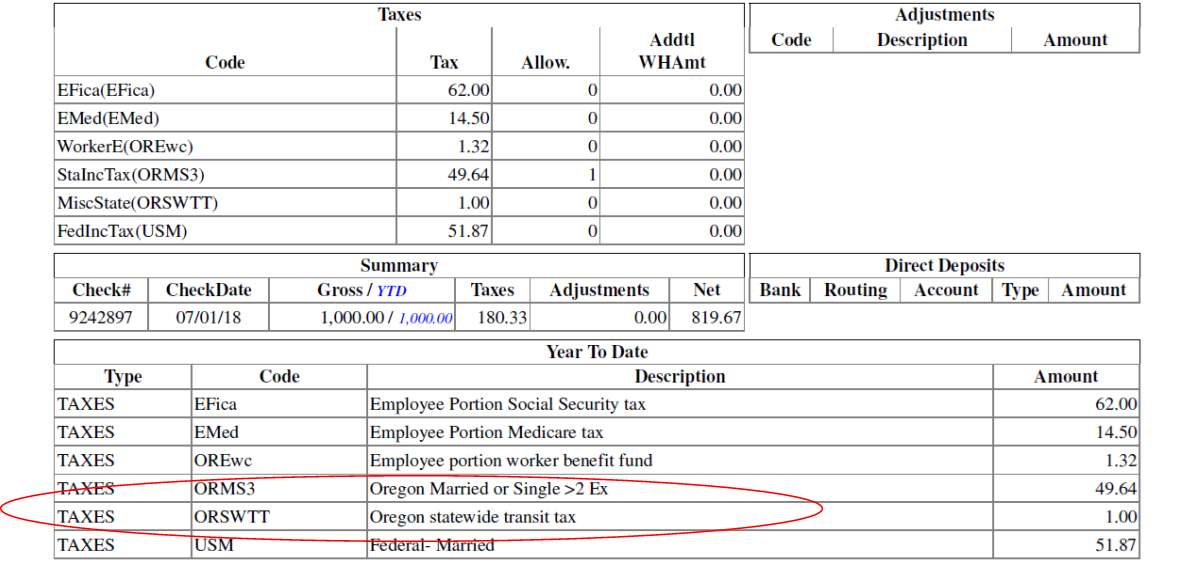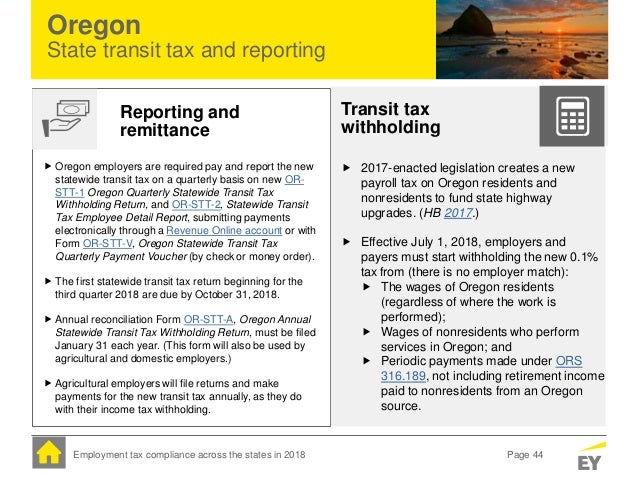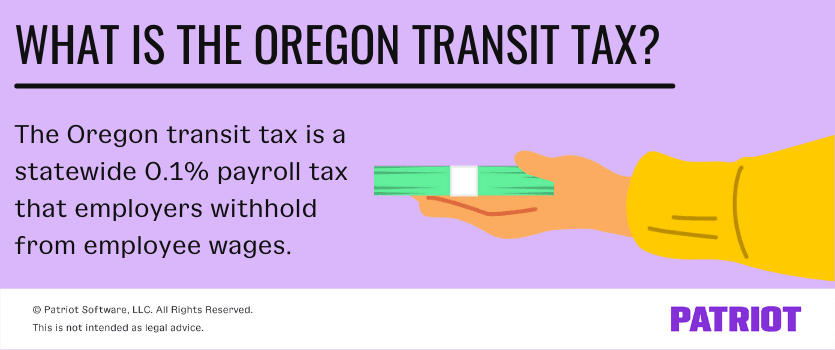Wages of nonresidents who perform services in oregon. Employees who aren’t subject to regular income tax withholding due to high exemptions, wages below the threshold for income tax withholding, or other factors are subject to statewide transit tax withholding.
Oregongov
Portion of the oregon quarterly combined tax report (form oq).
Oregon statewide transit tax exemption. Withholding the tax from employee wages,. The stt is calculated based on the employee's wages as defined in ors 316.162. Employees who aren’t subject to regular income tax withholding due to high exemptions, wages below the threshold for income tax withholding.
Those nonresident employers who are currently performing courtesy income tax withholding for oregon resident employees should have received a letter. The statewide oregon transit tax goes to the statewide transportation. As the employer, you do not pay the oregon transit tax.
Revenue from the statewide transit tax will go to expanding public transportation throughout oregon. (1) wages paid to residents of oregon regardless where they work; Unlike the personal income tax, there’s no withholding exemption for this tax.
This tax must be withheld on: Oregon statewide transit tax starting july 1, 2018, you'll see a new item on your paystub: How does this tax apply to me as an employer?
Effective july 1, 2018, employers must begin withholding the new 0.1% oregon statewide transit tax from the wages of oregon residents (regardless of where the work is performed, provided the employer has nexus) and the wages of nonresidents who perform services in oregon. A payroll tax is imposed at the rate of 0.1% on wages of residents of oregon or wages earned by nonresidents in oregon. Please note, those exempt from income tax withholding, aren't exempt from withholding for this tax.
There is no maximum wage base. A statewide transit tax is being implemented for the state of oregon. The tax rate is 0.10 percent.
From the oregon department of revenue website: Additionally, note that even employees who aren’t subject to regular income tax withholding are subject to oregon’s statewide transit tax withholding. Why are they exempt from deducting the transit tax?
Revenue from the statewide transit tax will go to expanding public transportation throughout oregon. Wages of oregon residents (regardless of where the work is performed). The 2017 oregon legislature passed house bill (hb) 2017, which included the new statewide transit tax.
Domestic service in a private home. The tax is generally referred to as the “statewide transit tax.” the tax is required to be withheld by the employer from applicable employee wages. The statewide transit tax is a tax on employee wages that are deducted, withheld, reported, and paid to the department of revenue by the employer.
For more information on how the tax revenues will be used, take a look at the oregon department of transportation’s keep oregon moving page. Employees who aren’t subject to regular income tax withholding due to high exemptions, wages below the threshold for income tax withholding, or other factors are still subject to statewide transit tax withholding. All wages paid for domestic service described in 316.162 (definitions for ors 316.162 to 316.221)(c) are exempt from withholding and transit payroll tax.
Income tax, there’s no withholding exemption for this tax. Employees are not exempt from the statewide transit tax withholding, even if they are exempt from federal income tax withholding. This requirement mirrors the requirements for state income tax withholding.
You are only responsible for withholding, reporting, and remitting withheld taxes to the state government. For minimum tax purposes, include only gross oregon unrelated business income in your oregon sales. The statewide transit tax is calculated based on the employee’s wages as defined in ors 316.162.
This includes employees with high exemptions or who have wages below the threshold for income tax withholding. The statewide transit tax is not the same as transit payroll taxes (trimet and lane transit). The transit tax will include the following:
Nonresident employers who are outside of oregon's taxing jurisdiction may deduct, withhold, report, and remit the statewide transit tax for oregon resident employees similar to oregon income tax withholding. Insurance companies (except domestic insurers). Statewide transit tax—july 1, 2018.
Southland data processing has added the new tax codes to your company and. The statewide transit tax is calculated based on the employee’s wages as defined in ors 316.162. (2) wages paid to nonresidents of oregon while they are working in oregon;
Exempt payroll the following are exempt from transit payroll taxes: Unless there is a regulation under texas law, if they have employees in oregon, they need to withhold oregon tax. Click accounts affected, choose do not affect accounts or affect liability and expense accounts.
Employees who aren't subject to regular income tax withholding due to high exemptions, wages below the threshold for income tax withholding, or other factors are subject to statewide transit tax withholding. The new statewide transit tax is calculated based on the employee's gross wages before any exemptions or deductions. Enter a negative adjustment if it is a reduction in the liability balance and a positive adjustment if it is an increase in the tax liability.
Oregongov
Oregongov

Oregon Transit Statewide Tax
Oregongov
Oregon Statewide Transit Tax

Ezpaycheck How To Handle Oregon Statewide Transit Tax
Oregongov
Oregongov

Ezpaycheck How To Handle Oregon Statewide Transit Tax
Oregon Statewide Transit Tax

New Transit Tax - Cardinal Services

Employment Tax Compliance Across The States In 2018

What Is The Oregon Transit Tax How To File More

Payroll Systems Attn Oregon - Statewide Transit Tax Effective July 1 - Payroll Systems
.jpg)
Or - Statewide Transit Tax Das
Oregongov

Ezpaycheck How To Handle Oregon Statewide Transit Tax

What Is The Oregon Transit Tax How To File More

Oregon Statewide Transit Tax

